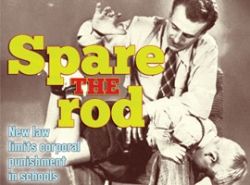Smoky Mountain News, Waynesville, North Carolina, 13 July 2011
Paddling on the decline, but still alive in WNC schools
By Colby Dunn
In North Carolina, it's illegal to hit a prison inmate. You can't hit a child in a day care center. Military officers can't hit their subordinates. In workplaces, nursing homes, hospitals and elsewhere, hitting is forbidden. It is even illegal to hit an animal.
But in the state's public schools, there's no ban on hitting, because North Carolina is one of 19 states that still allows corporal punishment to be used in schools.
The practice, once common, has fallen out of favor, but there are still 38 school districts out of 115 in North Carolina that allow kids to be punished with the paddle.
Only 17 used it last year, and only a handful of times compared to some other states, but the option still exists for teachers and administrators who find it effective. Haywood, Macon and Swain are among those that use it. Jackson and the Eastern Band do not.
Starting this school year, however, the choice falls into the hands of parents, who will be able to opt-out of corporal punishment for their child.
A bill just passed by the N.C. General Assembly requires school districts to get parent permission for corporal punishment at the beginning of the school year, a right already given to parents of students with disabilities last year.
Before, the only parental involvement required was notification. Schools had to let parents know they'd done it, but not necessarily before, and they certainly didn't have to ask permission.
Allison Best-Teague of Waynesville is one parent who will be taking the state up on that offer.
She doesn't use that kind of discipline in her own house and is glad she can now have a say in what happens to him at school, too.
"I'm actually against it for the school system overall, so I'm very glad to have the option to opt out for my child," said Best-Teague. "I really think the bigger problem is that the state is still allowing it."
Best-Teague now runs Blue Ridge Books in Waynesville, but she was once the director of KARE, a Haywood County anti-child abuse organization.
In her role there, she helped parents learn how to deal with disciplining their children. In all the methods she worked with, she never saw corporal punishment listed as an option.
The new state law is a win for groups such as Action For Children, a statewide policy group that advocates for the eradication of corporal punishment in North Carolina schools.
"It has helped that the legislature has voted on this, it has changed policies," said Tom Vitaglione, a senior fellow with the group. "It means that the school districts that are still allowing it will have to reassess their position on this."
And in Haywood County, that's certainly true. It has been used extremely sparingly in Haywood -- only 16 times out of student population of more than 7,000 between 2008 and 2010. This past school year, Assistant Superintendent Bill Nolte estimates fewer than 10 instances of paddling in the county's schools.
"It's just not used very often and when it is, it's by parent request," said Nolte. None of his schools, he said, ever suggest it to parents. But they might comply if a parent asks for it.
Now, however, the new state law might lead Haywood to end corporal punishment all together for fear of sending the wrong message to parents, Nolte said. The school system would have to send permission forms to the parents of all 7,000 students, creating the false public perception that corporal punishment is commonplace, Nolte said.
Nolte said the decision will be up to individual principals. But he doubts many will choose to send that paper home.
"It's not worth the trouble or the message to have that option available for five students," he said.
The result will likely be a de facto end to corporal punishment in Haywood.
The issue is expected to be on the agenda at Macon and Swain County school board meetings this month, if not to look at a ban, at least to discuss the new regulations.
To what end?
In Western North Carolina, there are a number of districts that still allow corporal punishment. Haywood, Macon, Swain, Graham and Transylvania counties are still on the list, as are Burke and McDowell. Jackson County banned it in 2001, and Cherokee and Clay counties have stopped over the past three years. The Eastern Band of Cherokee Indians school system does not use corporal punishment, either.
Even among chronic users, however, the numbers have dropped precipitously in recent years.
Burke County, for example, paddled 325 kids in the 2008-2009 school year. The next year, it was only 93.
Macon County was much the same: 71 in 2008-2009, but just 30 the following year.
School officials and advocates such as Vitaglione chalk this up to increased awareness and changing times.
"I really think it's probably a form of discipline that has aged out," said Nolte. "It's probably timed out in terms of its broad scope effectiveness."
Dan Brigman, Macon County's superintendent, concurs.
"Based on historical data, that's what I'm seeing," said Brigman. "I think corporal punishment is effective somewhat on a few students, but in most instances it's a temporary disciplinary measure and if it impacts long term behavior, that's a question."
And that view is essentially a watered-down version of what groups such as Action For Children have long been saying.
"Over the last two decades, study after study has come out regarding school discipline, and none have found that corporal punishment is effective, and by that we mean in ongoing student behavior," said Vitaglione. "Whatever indicator you use, there's no correlation in using corporal punishment and improving any of those other outcomes that you'd like in schools."
And the literature seems to back up that outlook.
Studies in places such as Psychological Bulletin and the Journal of School Psychology have noted little if any long-term changes in how students act because of paddling.
The debate over corporal punishment, though, is unlike other contentious issues in one notable way: it's pretty difficult to find a strong advocate on the other side of the ideological divide.
There are plenty who have taken the findings as ammunition for their vocal campaigns against the practice. The American Academy of Pediatrics has taken a position against it. The ACLU and Human Rights Watch teamed up in 2009 on a study and subsequent campaign that decried the use of corporal punishment on students with disabilities. Urban clothing pioneer Marc Ecko has launched a crusade called Unlimited Justice, a play on his Ecko Unlimited label, that seeks to ban physical punishment in all 50 states. There are numerous regional and local groups who have set up opposition.
But on the other side, it seems that there are only a few school administrators who will make a defense for it, and even then it's half-hearted and with some pretty strong caveats.
"It works on some occasions, on other occasions, that's not the answer for it," said Bob Marr, Swain County superintendent.
It could be, as Nolte said, that the practice is just trending out, fading in deference to a more modern perspective.
The touchy legal ramifications probably don't hurt, though.
While North Carolina hasn't really faced court challenges over corporal punishment, it is also pretty low in the numbers rankings.
Take Mississippi. In 2009-2010, Action For Children estimates there were 38,000 instances of corporal punishment in that state's schools. Fellow Southern states Arkansas, Texas and Alabama were similarly inclined, their numbers reaching into the tens of thousands. In comparison, North Carolina's approximately 700 instances are hardly in the same league.
In Mississippi, however, three suits were brought against school systems for corporal punishment in 2010.
One, a gender discrimination suit brought by a male high schooler, is still working its way through the courts. Two others were money damages suits brought against a single district. The students in those cases were 11 and 6.
In Tennessee, a high school basketball player brought a case against his coaches for what the player said was excessive use of paddling. He lost on appeal, as the court said the action was disciplinary.
That sticking point is one of the key objections of anti-corporal punishment activists.
In North Carolina, teachers and administrators are immune from any prosecution over practicing physical discipline unless the child needs medical attention.
Even then, said Vitaglione, he's not encountered a parent willing to prosecute.
"There have been a few instances where we've heard of a child being injured, but we have not had a family who was willing to participate in filing a suit," said Vitaglione. "In part they feel intimidated, in part they feel guilty on their own. We, frankly, are loathe to get into that as well. We would prefer that the decision be made in the school board room or in the legislature."
The legislature, however, is unlikely to enact an outright ban anytime soon. Bills with such proposals were defeated in 2007, 2008 and 2009. This most recent bill leaves the choice in local and parental hands, and both lobbyists and legislators anticipate that it will stay that way.
"Probably not," was Rep. Ray Rapp's, D-Mars Hill, answer, when asked if he saw a blanket ban coming anytime soon, although Rapp himself does not support corporal punishment. "I would say that most legislators may have strong feelings one way or the other on it, but they're content to leave it to local jurisdictions."
Action For Children says they'll take what they can get, but statewide elimination is really what they're pushing for.
One of the main reasons is oversight. There really isn't any. The state has hitherto not required any reporting of corporal punishment statistics, nor have they handed down any guidelines on how, when or why the discipline can be meted out.
In Haywood County, it's a principals-only policy. In other school districts, teachers, teacher's assistants and even substitute teachers are allowed.
Without more careful oversight, say advocacy groups, some sections of the student population may be getting a disproportionate share of the corporal punishment.
Nationally, that ACLU-Human Rights Watch study found this to be the case for students with disabilities. They found those students twice as likely to be hit than the general student body.
Rapp believes that's partly why it's on the decline, and why lawmakers were spurred to action on the issue over the last few years.
"Without the strictest supervision and care, you can easily find yourself in court," said Rapp.
In North Carolina, the districts that allow spanking and paddling are quickly dwindling. Gaston County eliminated it a few months ago. Vitaglione expects Greene County to follow suit at their school board meeting next week. The issue came up at Monday's Swain County School Board meeting, where the board decided to send the forms to parents this year and revisit the question later.
Macon County's school board is scheduled to discuss it later this month, if not to consider a ban, at least to look at new regulations.
Nationwide, the trend is also towards extinction for the disciplinary tactic. Most major urban areas have long since outlawed it -- New York City schools have had a policy against it since the 19th century.
States that still allow it are mostly in the South, with a few dotted around the rural west.
Internationally, the United States is alone among developed nations in still allowing it in schools. Many developing nations -- Iran, Iraq, Turkmenistan, Malawi, Namibia and many others -- also forbid it.
Though a nationwide ban seems as unlikely as a state proscription, it's more plausible that de facto bans will become more widespread, as legislation like North Carolina's recent bill become more commonplace.
Locally, school administrators say most parents think it has already long been phased out anyway.
"I do think the new law probably makes it impractical to even have as an option," said Haywood's Bill Nolte. "Do you want to sent home 7,000 sheets of paper for something you may or may not even do? What's the practicality in that?"
Copyright © 2011 Smoky Mountain News. All Rights Reserved.
Cleburne Times-Review, Texas, 21 July 2011, p.1
CISD board bans corporal punishment
By John Henry
Special to the Times-Review
The Cleburne school district board of trustees have, once and for all, settled one of education's great controversies.
Trustees voted unanimously on Monday to remove corporal punishment as a disciplinary tool for students in the CISD.
The vote bans district employees and even parents from using the practice on school campuses.
As a general rule, school principals within the district for several years have opted not to use the method, though it remained an option if parents gave permission through a signed document.
"Every year, I check 'no' to that because I felt like I would do a better job of it," said school board President Stu Madison of disciplining his own children.
"Speaking from experience as a child, my father's corporal punishment was much more effective than the principal's."
Not even debates about football have generated as much passion among opponents and proponents of corporal punishment.
Liability to the school district is but one issue. Trustee DeWayne Burns acknowledged that initially he was conflicted over the wisdom of completely eliminating the practice because "I want to give our teachers and administrators every tool available to do what they need to do their jobs effectively."
"But in the end, when you look at the liability it exposes us to, I don't see we have any other option," said Burns in agreeing that the practice opens the door for an injured child to include the school district in legal action, even if a parent shelled out the discipline on school campus.
Effectiveness, especially among professionals in the child development realm, is another, and even larger, issue.
Columbia University examined 88 studies related to corporal punishment almost 10 years ago.
That study concluded that while the practice does indeed increase immediate favorable behaviors, more widespread negative factors resulted over the long term, such as increased aggressive and antisocial behaviors.
"In my opinion, the act of swatting or paddling a child for some student code of conduct [violation] might not be as effective as, say, another disciplinary consequence that may follow the action," Superintendent Tim Miller said.
As a result of the board's action, permission for faculty to use corporal punishment will not be among the signature documents sent home to parents this school year, CISD director of community relations Lisa Magers said.
And with that so go the glorified lore of receiving and having survived "licks" from the biggest and baddest coach, stories old-timers like to tell decades after graduation. For many, licks were a rite of passage in another, very former, machismo world.
"I think the responsibility lies at home," Madison said. "I think it's a good thing we're eliminating this because the parents won't be able to say 'your teacher will take care of it' or 'your principal will take care of it.'
"There's way too much of that going on in society anyway. This is the parents' job and, by golly, we're going to make sure that the public knows this is the parents' job."
© 2011 Community Newspaper Holdings, Inc.
The Lufkin Daily News, Texas, 26 July 2011
Huntington ISD votes to retain 'retire/rehire' employees
By Melissa Crager
The Lufkin Daily News(extract)
HUNTINGTON -- The Huntington Independent School District board of trustees voted Monday night to extend its contract with a third-party vendor to retain its experienced teachers.
[...]
Also during Monday night's meeting, the board discussed several changes to the student handbook.
J'Nelle Short addresses the Huntington school board during its meeting Monday night.
Some of the changes included allowing students to use cell phones, laptops and smart devices on the school's Wi-Fi system at a teacher's or principal's discretion; adding corporal punishment as a more readily available option; allowing students taking honors or weighted classes to earn a grade of 60 or above and still be eligible to participate in UIL activities; and limiting the number of people allowed on campus each day to parents, immediate family members, recruiters, pastors or youth ministers.
[...]
About this website
Search this site
Article: American school paddling
Other external links: US school CP
Archive 2011: USA
Video clips
Picture index
Previous month
Following month




